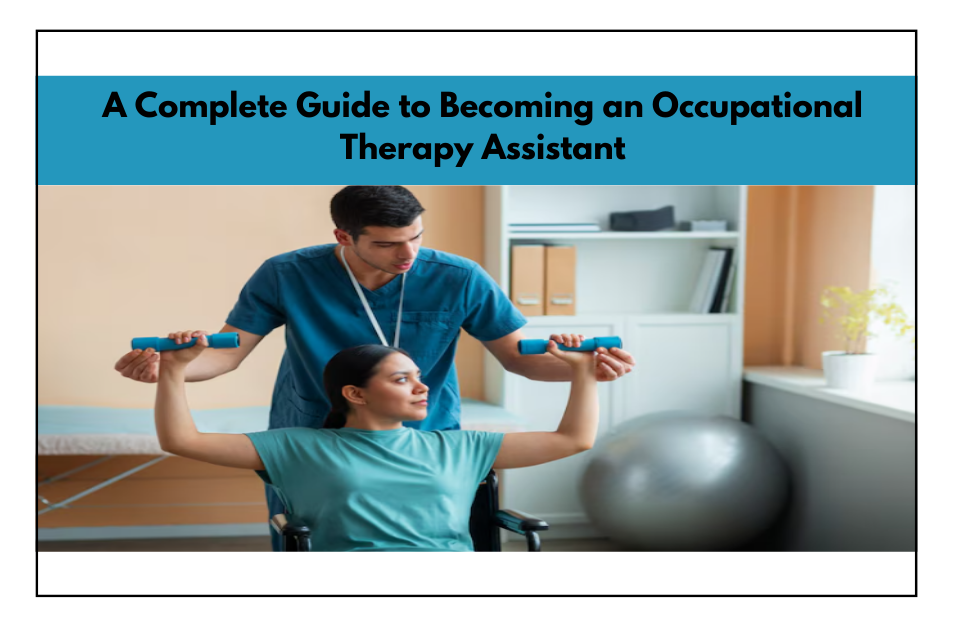Do you think of having a career that can earn you a better living and, at the same time, help lead a healthier and more contented life? If so, the occupational therapy assistant (OTA) profession would suit you well!
In this guide, we will explore the career of an OTA, explaining the nature of the job, the expectations, and how to get into this field. This handbook will give you all the vital information on excelling in this career and making your final decision.
What is an Occupational Therapy Assistant?
An Occupational Therapy Assistant (OTA) is a qualified healthcare assistant who works under the supervision of an Occupational Therapist to facilitate occupational therapy sessions that promote independence in all facets of life. OTAs assist patients who face physical, mental, or emotional problems by facilitating therapeutic activities designed to enhance their ability to perform everyday tasks.
It may involve the inclusion of children with disabilities in schools and social activities, providing rehabilitation to adults who have recovered from injuries, or caring for the elderly who experience physical and mental deterioration.
The role of an OTA is hands-on and collaborative, involving the implementation of treatment plans developed by the Occupational Therapist. These plans mostly use different types of therapy, which are exercises, activities, and adaptive devices that enhance the patient’s capacities in doing day-to-day work like dressing, cooking, and working.
Another essential step is documenting patients’ progress with customized treatment plans to provide them with better efficiency. In short, OTAs profoundly improve the living conditions and quality of life for many clients, making the profession not only vital but also very interesting.
How to Become an Occupational Therapy Assistant?
Step 1: Get the Right Education
In order to become an occupational therapist, it is advisable to participate in occupational therapy assistant programs. These programs usually last about two years and are offered at various community colleges, technical schools, and, sometimes, universities. The program provides a well-shaped curriculum incorporating theoretical classroom learning and practical fieldwork experiences that give a student-therapist a comprehensive basis for future professional life.
Step 2: Pass the Certification Exam
After finishing the list of educational requirements, the next essential step is to appear in the National Board for Certification in Occupational Therapy (NBCOT) examination. Successfully passing this exam is important because it constitutes the certification allowing you to practice Occupational Therapy professionally. It makes you an expert in the field and allows you to use the designation “COTA,” an acronym for Certified Occupational Therapy Assistant, thus cementing your post within the field.
Step 3: Obtain a License
In almost every US city, occupational therapy assistants are required to obtain licensure. State requirements for licenses may vary by state. However, in many cases, you may be requested to provide evidence of your education and proof of NBCOT certification; in rare instances, you may also need to take some state-specific test. Consulting with your state’s licensing board is recommended for getting to know the processes you must follow to qualify for licensure.
Step 4: Keep Learning
When you start a job as an Occupational Therapy Assistant (OTA), active, continuous professional development is necessary to continue your certification and license. Such profession-oriented commitment keeps you informed of the latest progress in occupational therapy and elevates your ability as a professional. Thus, you deliver your service at the best level.
Day-to-Day Work of an OTA
The day-to-day job of an occupational therapist is filled with new demands and experiences, which creates an exciting working platform where a day is never like the other. The primary responsibility is to deal directly with patients, helping them to execute the instructions outlined in the treatment plans. Your responsibility, therefore, goes beyond equipment setup and treatment area preparation to ensure that things move smoothly. Moreover, it is vital to write down the patients’ progress as this is essential, and it helps all the people involved in their care stay updated on their achievements and challenges.
The professional settings you may encounter are diversified, whether in the hospital setting, private occupational therapy practices, schools, nursing homes, or even in the patients’ homes in some home health contexts. The very essence of your job is physically intensive. You may have to move patients and rotate the course of rehabilitative exercises. Therefore, emotional resilience plays a significant role in your success, as you frequently deal with patients experiencing severe problems.
Tips for Success as an OTA
Embarking on a career as an occupational therapy assistant is an exciting journey, and here are some essential tips to guide you toward success:
- Stay Positive – Maintaining a positive attitude is beneficial to your professional success and translates to your patients’ improvement and recovery. A cheerful environment can improve the space entirely and make it more productive and full of hope.
- Be Flexible – Flexibility is the main feature of this field. Patients come with distinctive challenges and needs, so a flexible therapy approach that considers those different conditions is the key to successful treatments.
- Keep Learning – The science of occupational therapy keeps developing with newer techniques and theories. Being updated with the most recent knowledge is essential in delivering quality care and staying competent in your practice.
- Communicate Clearly – Clear communication is one of the pillars of occupational therapy. It’s critical to understand the treatment plans in detail, listen attentively to families’ needs, and collaborate well with other healthcare practitioners so that you can achieve the best results for your patients.
Therefore, the decision to become an occupational therapy assistant (OTA) has the potential to be extremely rewarding, as it allows you to profoundly impact the lives of others. Working as a physician combines the fantastic feeling of helping people with the positive aspects of the constantly increasing demand for medical services.
If you possess a genuine passion for helping others and are looking for a challenging but rewarding career, becoming an OTA could be your ideal match. So, start this exciting journey now. A promising and fulfilling career as an OTA is just ahead, waiting for you to take that first step.


